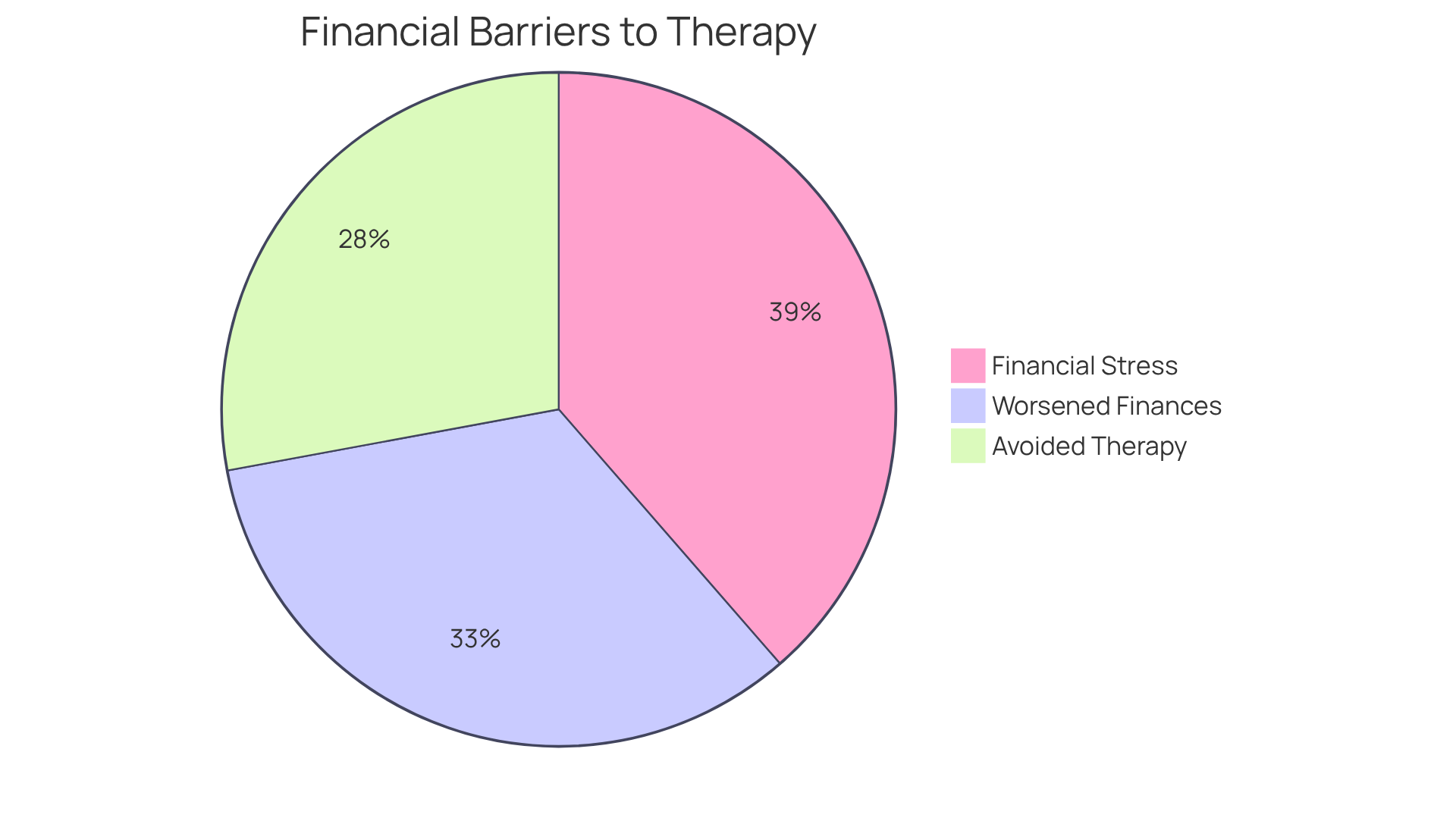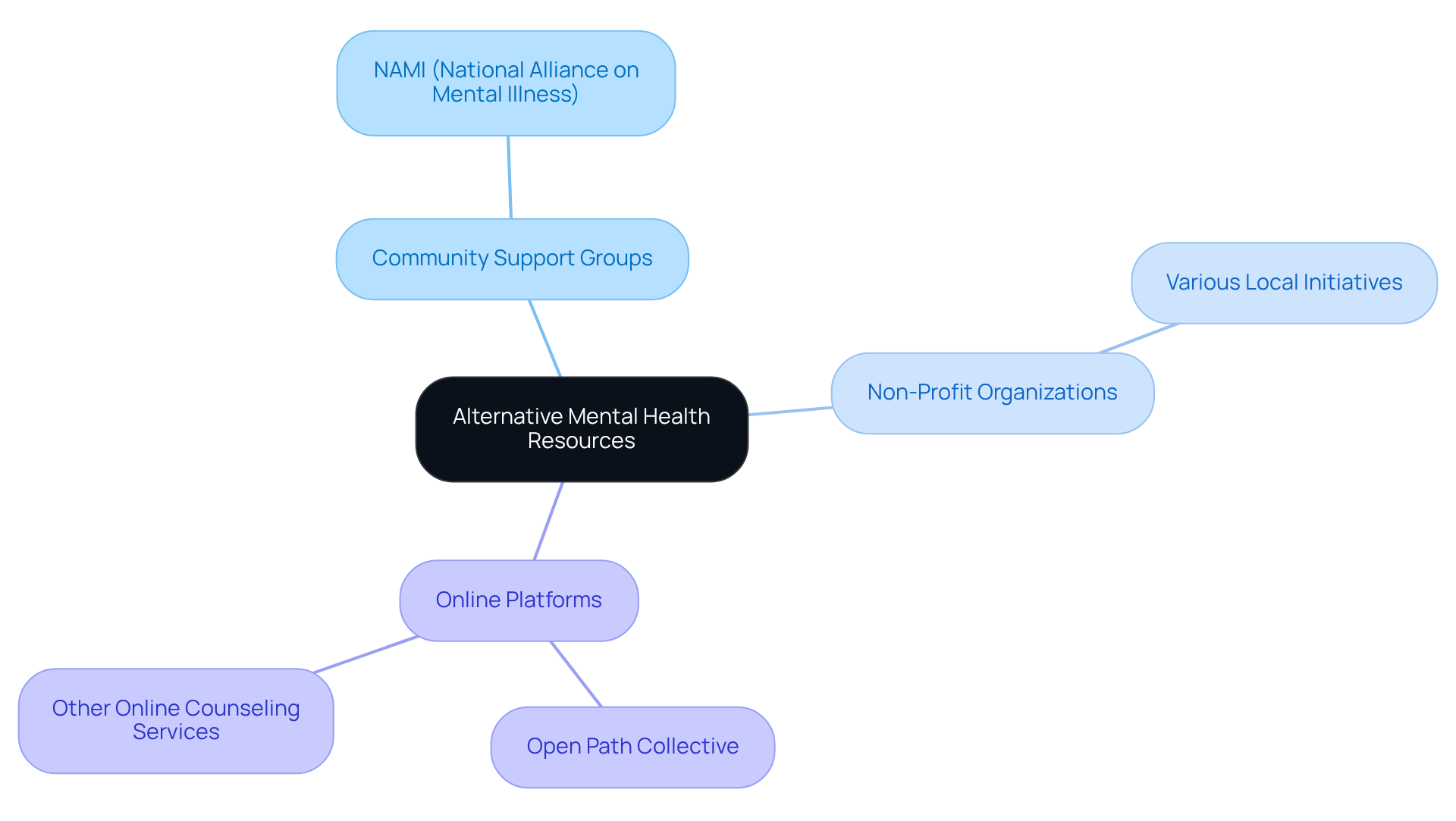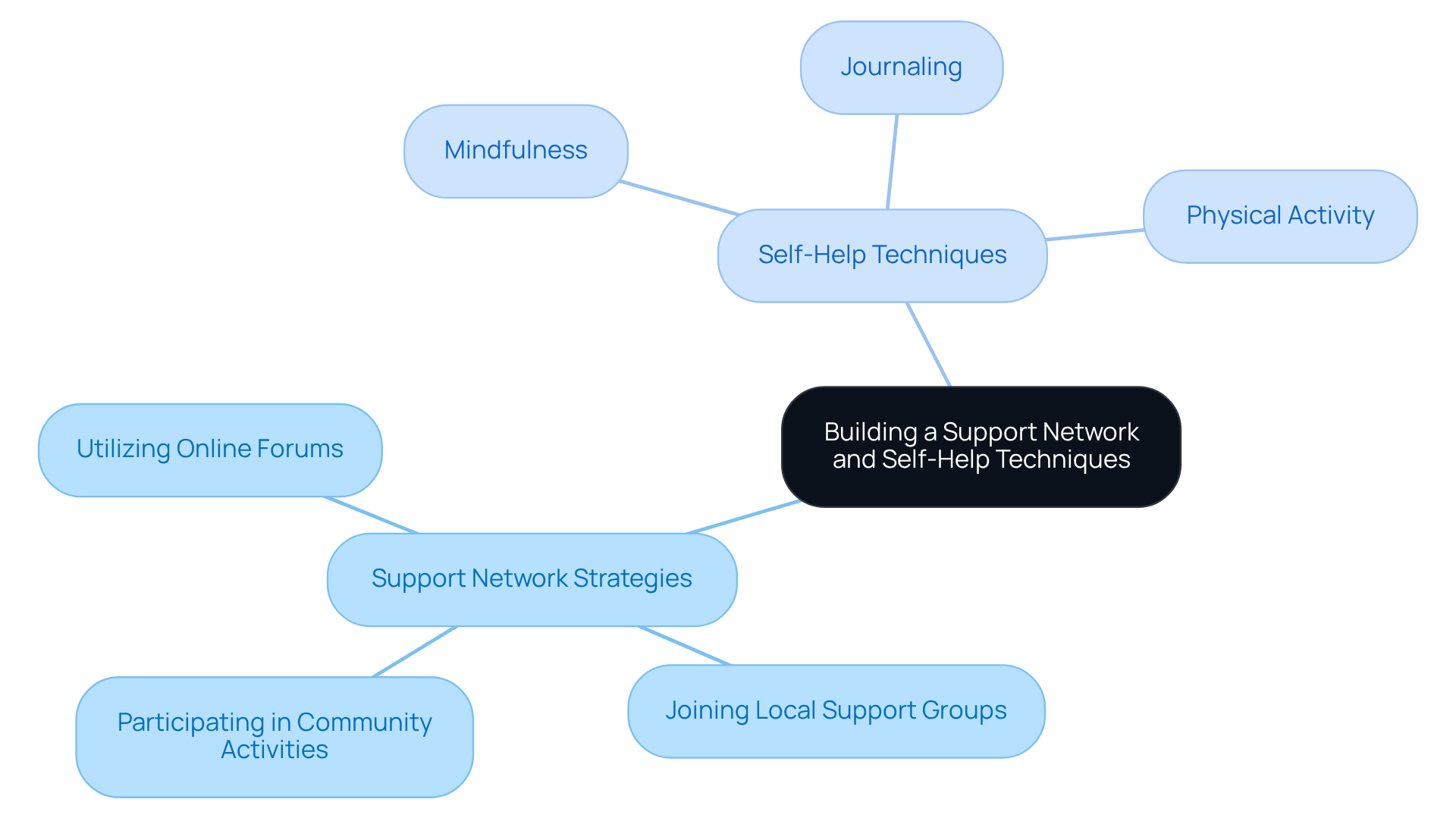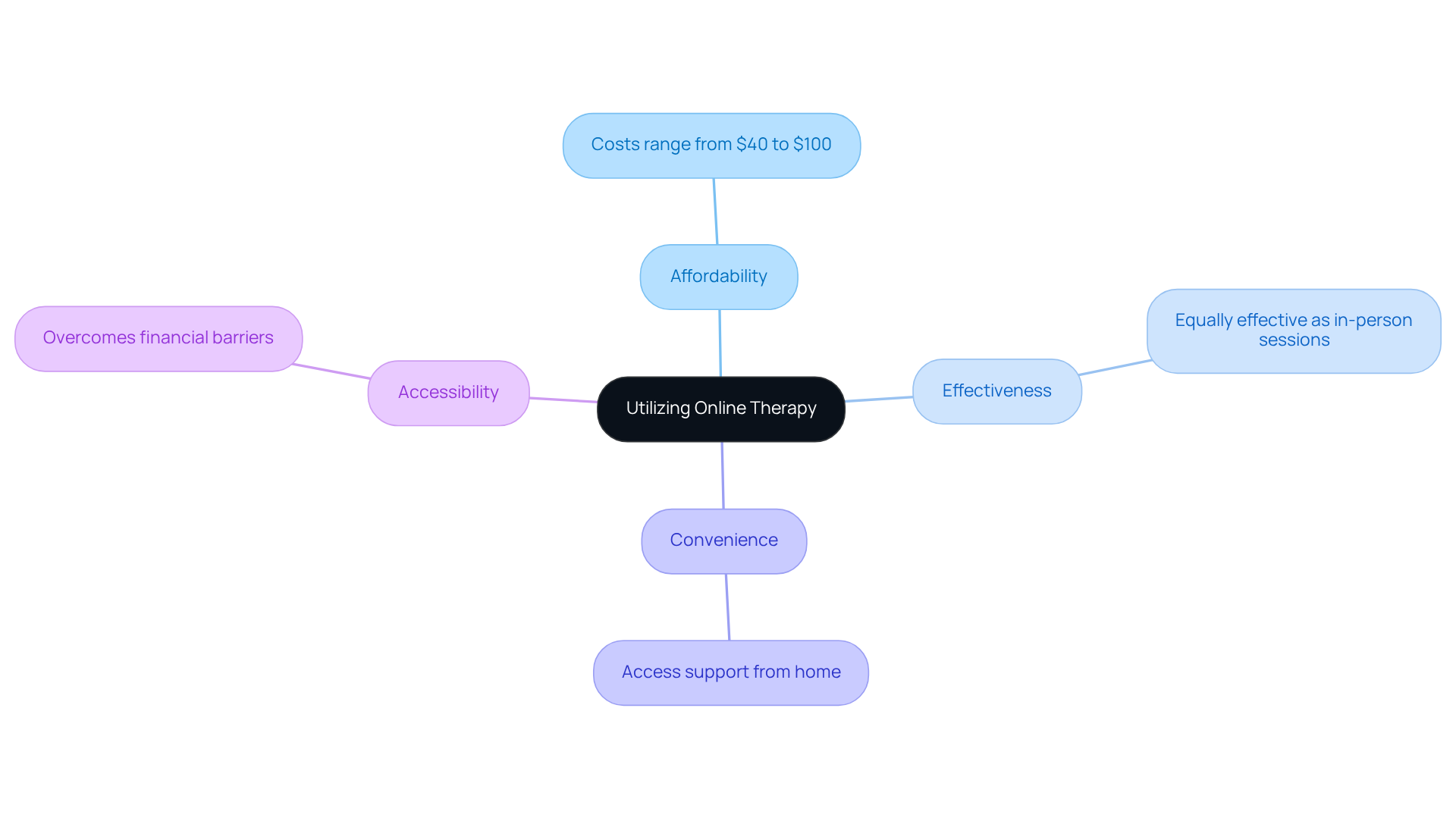Overview
This article compassionately addresses the financial barriers that often prevent individuals from accessing therapy. Have you ever felt overwhelmed by the thought of seeking help due to high costs or inadequate insurance coverage? You're not alone. Many share the sentiment of 'I can't afford therapy.' This feeling can be disheartening, but there are alternatives available that can support your mental health journey.
As we explore this further, consider the following alternatives:
- Community support groups
- Online therapy options
- Self-help techniques
These viable alternatives can provide the healing you seek without the financial strain. By embracing these options, you can take meaningful steps towards improving your mental well-being. Remember, seeking help is a sign of strength, and there are paths available that align with your needs.
Introduction
The rising costs of therapy have left many individuals grappling with the daunting thought, "I can't afford therapy." Have you ever felt this way? With average session fees soaring between $100 and $200 in 2025, coupled with inadequate insurance coverage, the financial barriers to accessing mental health support are more pronounced than ever. This can feel overwhelming, especially for those who yearn for help but find themselves excluded from traditional therapy options.
As we explore this further, this article delves into the myriad challenges faced by those seeking help, while also illuminating alternative resources and strategies that can bridge the gap. It's important to know that support is available, even when it seems out of reach. How can individuals navigate this complex landscape and find the support they desperately need without breaking the bank? Together, we can uncover paths to healing that feel accessible and nurturing.
Defining the Financial Barriers to Therapy
Many individuals who seek help are affected by financial obstacles to counseling, often expressing that 'I can't afford therapy'. The challenge is exacerbated by and limited insurance coverage, leading many to feel that 'I can't afford therapy' due to the economic strain faced by countless people. In 2025, therapy sessions in the U.S. typically range from $100 to $200, a price that makes many feel that 'I can't afford therapy' while navigating financial instability. Additionally, systemic issues like insufficient insurance coverage and high deductibles further hinder access to vital psychological services.
Have you ever felt that the cost of seeking help is just too high? Reports indicate that almost 60% of people have refrained from pursuing psychological support because they believe, 'I can't afford therapy,' highlighting a significant divide in accessibility that impacts overall well-being. Furthermore, 83% of Americans report experiencing financial stress driven by inflation and rising living costs, contributing to the feeling that 'I can't afford therapy'. As Dr. Michelle Morse, Acting Health Commissioner, emphasizes, timely access to high-quality, affordable psychological support is essential for everyone in need.
Remarkably, despite these obstacles, 33% of individuals resumed therapy within one week in 2025, showcasing resilience and a desire to return to care. However, it is crucial to recognize that 72% of respondents indicated their psychological issues worsened their financial situation, illustrating the complex relationship between financial stress and well-being, particularly for those who feel they can't afford therapy. Additionally, demographic factors play a role, with 33% of Black individuals facing psychological issues living in households that are overdue on payments, underscoring the inequalities faced by various groups.
In light of these challenges, it’s important to remember that seeking help is a vital step towards healing.

Exploring Alternative Mental Health Resources
Alternative psychological resources can be a beacon of hope for those seeking support. For those who feel that 'I can't afford therapy', community support groups, non-profit organizations, and online platforms provide affordable, and sometimes free, services designed to nurture well-being.
Have you ever felt overwhelmed by your past? Groups like NAMI (National Alliance on Mental Illness) provide peer-led support gatherings that can be invaluable for individuals who feel, 'I can't afford therapy,' while looking for connection and understanding, all without the financial burden of traditional counseling.
In addition to this, online services such as Open Path Collective present counseling sessions at lower costs, making it easier for individuals who feel that 'I can't afford therapy' to access mental health support. These options not only offer assistance but also among those facing similar challenges.
As we explore these resources further, remember that seeking help is a courageous step towards healing and connection.

Building a Support Network and Self-Help Techniques
Establishing a support network is essential for well-being, particularly for those who feel that they can't afford therapy. Have you ever felt overwhelmed by your past? Friends, family, and community members can offer both emotional support and practical assistance. Techniques such as:
- Joining local support groups
- Participating in community activities
- Utilizing online forums
can help you connect with others who share similar experiences.
In addition to this, self-help techniques like:
- Mindfulness
- Journaling
- Physical activity
can significantly enhance emotional resilience. These strategies not only foster but also nurture a sense of belonging and community, which is crucial for recovery. Remember, you are not alone on this journey; reaching out for support is a strong and positive step towards healing.

Utilizing Online Therapy as an Affordable Option
Online counseling has emerged as a viable and affordable option for many seeking mental health support. Have you ever felt overwhelmed by your past? Platforms like BetterHelp and Talkspace offer that can range from $40 to $100 per week, significantly lower than conventional face-to-face counseling expenses. For individuals with hectic lifestyles or financial limitations, the convenience of accessing support from home through online counseling is appealing, especially when I can't afford therapy.
As we explore this further, studies suggest that virtual counseling can be equally effective as in-person sessions. This means individuals can access essential resources to handle their psychological well-being efficiently. As the demand for accessible mental health care continues to grow, online therapy offers a promising solution for individuals who say, 'I can't afford therapy,' helping to overcome financial barriers.
Consider the possibility of taking that step towards healing. Online counseling could be the support you need to navigate through challenging times, offering you the opportunity to prioritize your mental health from the comfort of your own home.

Conclusion
Many individuals encounter significant financial barriers when seeking therapy, often leading to the feeling of 'I can't afford therapy.' The rising costs of counseling sessions, combined with insufficient insurance coverage and systemic challenges, create a difficult environment for those in need of mental health support. This struggle transcends personal obstacles, reflecting a broader societal issue that impacts the well-being of countless individuals.
Throughout this article, we have highlighted the urgent need for accessible mental health resources. Statistics reveal that many people hesitate to seek help due to financial constraints. However, alternative options such as:
- Community support groups
- Non-profit organizations
- Online therapy platforms
are emerging as viable solutions. These alternatives not only offer affordable support but also nurture a sense of belonging and community, which are vital for emotional resilience and recovery.
Recognizing the importance of mental health in our overall well-being is essential. As financial barriers continue to hinder access to therapy, it becomes crucial to explore and utilize available resources. Have you ever considered building a support network, engaging in self-help techniques, or opting for online counseling? Taking proactive steps towards mental health care can pave the way for healing. Embracing these alternatives not only addresses the immediate need for support but also contributes to a more equitable mental health landscape for everyone.
Frequently Asked Questions
What are the main financial barriers to therapy?
The main financial barriers to therapy include high session costs, typically ranging from $100 to $200, limited insurance coverage, and high deductibles, which make it difficult for many individuals to afford the necessary psychological services.
How prevalent is the belief that therapy is unaffordable?
Reports indicate that almost 60% of people have refrained from pursuing psychological support because they believe they cannot afford therapy, highlighting a significant divide in accessibility.
What percentage of Americans report experiencing financial stress?
83% of Americans report experiencing financial stress driven by inflation and rising living costs, contributing to the feeling that therapy is unaffordable.
What is the impact of psychological issues on financial situations?
72% of respondents indicated that their psychological issues worsened their financial situation, showing the complex relationship between financial stress and well-being.
How quickly do individuals resume therapy after facing financial barriers?
Despite financial obstacles, 33% of individuals resumed therapy within one week in 2025, demonstrating resilience and a desire to return to care.
Are there specific demographic factors that influence access to therapy?
Yes, demographic factors play a role, with 33% of Black individuals facing psychological issues living in households that are overdue on payments, highlighting inequalities faced by various groups.
Why is seeking help considered a vital step towards healing?
Seeking help is essential for healing as it allows individuals to address their psychological issues, which can improve their overall well-being and potentially alleviate some of the financial stress they face.




